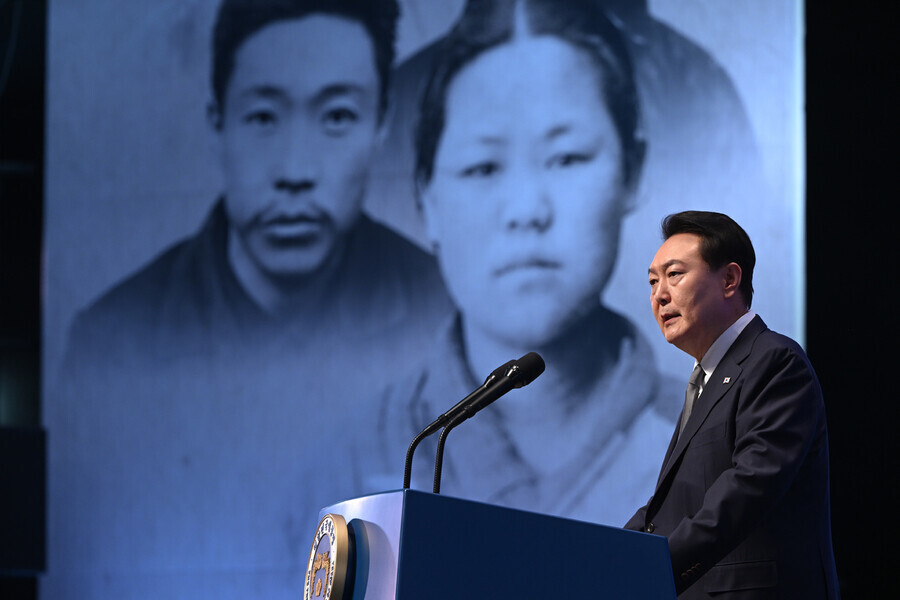hankyoreh
Links to other country sites 다른 나라 사이트 링크
Seoul unveils plan for compensating Korean victims of Japan’s forced labor

The administration of Yoon Suk-yeol in South Korea on Monday officially announced the framework of its plan for compensating victims of forced labor during the Japanese occupation, which will involve the private sector, including Korean companies, solely funding reparations, leaving the Japanese government and Japanese companies off the hook.
The plan is the culmination of the unilateral diplomacy practiced by the administration, which has been pounding the drum of “future-oriented” Korea-Japan relations and strengthening Korea-US-Japan cooperation while neglecting to acknowledge historical conflicts.
The omission of measures ensuring Japanese defendants' participation in reparations, as well as of a direct apology from the Japanese government for this painful history, is expected to generate a strong backlash from victims and the general Korean public.
Speaking with reporters at Incheon International Airport on Friday on his way to Washington, Kim Sung-han, the director the National Security Office, said that consultations between South Korean and Japanese diplomatic authorities were “in the final stages” on how to resolve the impasse in the forced labor compensation negotiations between the two countries.
Foreign Minister Park Jin officially announced an outline of the third-party repayment plan on Monday on behalf of the government. Under the plan, the Ministry of the Interior and Safety’s Foundation for Victims of Forced Mobilization by Imperial Japan will receive contributions from the private sector, including domestic companies, to pay compensation to victims of forced labor, whose right to compensation is grounded in a 2018 Supreme Court decision.
Without contributions to the fund by the Japanese defendants in that case (Nippon Steel and Mitsubishi Heavy Industries) having been secured, only South Korean companies are expected to participate.
Japanese Prime Minister Fumio Kishida is expected to issue a statement that the country will uphold a joint declaration between the two countries inked in 1998. The joint declaration, made by Korean President Kim Dae-jung and Japanese Prime Minister Keizo Obuchi, voiced Obuchi’s “deep remorse and heartfelt apology” for Japan’s “colonial rule,” and called for the two countries to “squarely face the past” to “build a future-oriented relationship.”
Kishida’s speech, however, will reportedly not include a direct apology for forced mobilization.
Instead, the two countries have tentatively finalized a plan to establish a tentatively named “future youth fund” through the Federation of Korean Industries and the Japan Business Federation in the name of developing future-oriented bilateral relations.
“We are discussing how the youth and future generation of Korea and Japan can play a role in ushering in a new era of bilateral relations and how they can accumulate their potential,” said Kim Sung-han, the national security advisor.
The Yoon administration has been pushing to hold a summit in Japan this month. The idea is to remove restrictions on Japan’s export of semiconductor materials and normalize the GSOMIA (General Security of Military Information Agreement) between South Korea and Japan as outcomes of “restoring normal diplomacy.”
By Kim Mi-na, staff reporter; Shin Hyeong-cheol, staff reporter; Kwon Hyuk-chul, staff reporter
Please direct questions or comments to [english@hani.co.kr]
Editorial・opinion
![[Editorial] Penalties for airing allegations against Korea’s first lady endanger free press [Editorial] Penalties for airing allegations against Korea’s first lady endanger free press](https://flexible.img.hani.co.kr/flexible/normal/500/300/imgdb/original/2024/0502/1817146398095106.jpg) [Editorial] Penalties for airing allegations against Korea’s first lady endanger free press
[Editorial] Penalties for airing allegations against Korea’s first lady endanger free press![[Editorial] Yoon must halt procurement of SM-3 interceptor missiles [Editorial] Yoon must halt procurement of SM-3 interceptor missiles](https://flexible.img.hani.co.kr/flexible/normal/500/300/imgdb/child/2024/0501/17145495551605_1717145495195344.jpg) [Editorial] Yoon must halt procurement of SM-3 interceptor missiles
[Editorial] Yoon must halt procurement of SM-3 interceptor missiles- [Guest essay] Maybe Korea’s rapid population decline is an opportunity, not a crisis
- [Column] Can Yoon steer diplomacy with Russia, China back on track?
- [Column] Season 2 of special prosecutor probe may be coming to Korea soon
- [Column] Park Geun-hye déjà vu in Yoon Suk-yeol
- [Editorial] New weight of N. Korea’s nuclear threats makes dialogue all the more urgent
- [Guest essay] The real reason Korea’s new right wants to dub Rhee a founding father
- [Column] ‘Choson’: Is it time we start referring to N. Korea in its own terms?
- [Editorial] Japan’s rewriting of history with Korea has gone too far
Most viewed articles
- 1Months and months of overdue wages are pushing migrant workers in Korea into debt
- 2[Editorial] Penalties for airing allegations against Korea’s first lady endanger free press
- 3Bills for Itaewon crush inquiry, special counsel probe into Marine’s death pass National Assembly
- 4Trump asks why US would defend Korea, hints at hiking Seoul’s defense cost burden
- 560% of young Koreans see no need to have kids after marriage
- 6S. Korea discusses participation in defense development with AUKUS alliance
- 7[Reporter’s notebook] In Min’s world, she’s the artist — and NewJeans is her art
- 8Korean firms cut costs, work overtime amid global economic uncertainties
- 91 in 3 S. Korean security experts support nuclear armament, CSIS finds
- 10[Guest essay] Maybe Korea’s rapid population decline is an opportunity, not a crisis